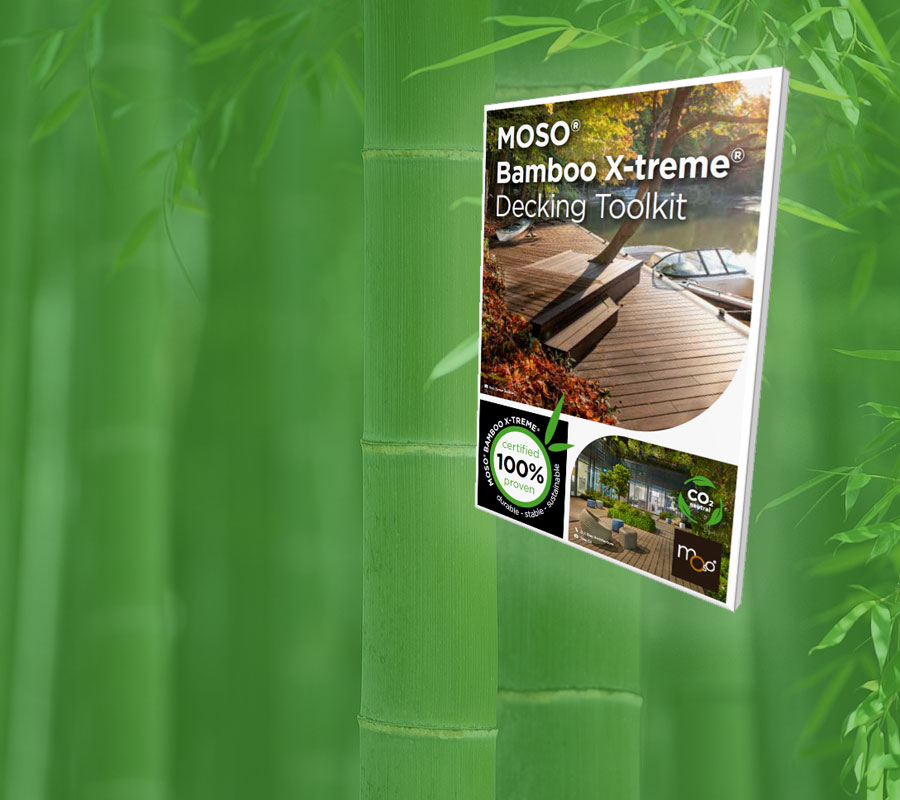In a world in which our environment needs to be pushed to the number one priority, there is a shift to more conscious behaviour throughout all markets. Not just picking up the newest vegetarian range in the supermarket, but also when looking to materials for construction projects. But what environmental benefits can be reaped when choosing a MOSO® Bamboo X-treme® deck for your project?
Compare Bamboo X-treme® with other materials in our comparison tool.
The rapid renewability of bamboo
One of the fastest growing plants in the world, growing up to 1 meter a day. Some species of bamboo grow so fast that it can be seen by the naked eye. Such incredible speeds mean that once the bamboo stem has been harvested it is able to grow back just as fast. Moso bamboo matures after just 4-5 years. This means that with a 25 year warranty of a deck in your project, the bamboo stem will have grown back 5 times during the warranty period.
Carbon storage
Bamboo absorbs CO2 from the air in large amounts and keeps this stored in the bamboo fibres. Not just during the growth, but in the bamboo fibre so as long as your deck is in use. This means that large amounts of carbon are stored in your deck, your cladding, your project for the rest of their life and even longer if they are upcycled. The extreme durability of MOSO® Bamboo Products means that an upcycled life is very likely and this is something the product is more than capable of reaching.
No deforestation
Unlike the cutting of other wood, harvesting bamboo stems does not mean a danger of deforestation, but it is actually beneficial. In fact, to sustainably manage a bamboo forest, 20-25% of the stems need to be harvested annually to ensure sustainable growth. Many different stems come from the mother plant, so once they are harvested these stems grow back rather than the plant dying off. Where the ground is not suitable for vegetation, bamboo is often used to regenerate and reforest areas.
Responsible harvesting
As previously touched upon, bamboo actually matures and grows better when a part of the stems is harvested. Harvesting bamboo is, by nature, environmentally friendly and has its benefits because of this exact reason. Bamboo farmers want to ensure their forest thrives and by ensuring that this is done well, the annual harvest increases and the forest becomes an even bigger carbon storage base.
Carbon footprint
MOSO® is the only bamboo product producer worldwide to have fully scientifically researched the environmental effects of production. Even with production in China and the fact that MOSO® Bamboo X-treme® needs to be further processed, unlike other wood species, bamboo is a more environmentally conscious option than other non-renewable and synthetic decking options.
Does bamboo material have environmental benefits?
Bamboo is unsurpassed in many areas and when looking for a decking solution that is also environmentally friendly, bamboo is most certainly a suitable option. A responsible and beautiful deck with plenty of environmental benefits to choose from. Are you interested in knowing more about the sustainability of MOSO® Bamboo Products? Read more about the research conducted and sustainable aspects of bamboo here.



.jpg?quality=high&width=900&height=450&name=Bamboo%20forest%20resource%20blog%20header%20(1).jpg)







%20Picture%20by%20Tim%20Baynham%20-1.jpg?width=600&height=300&name=2021006%20LR%20(20)%20Picture%20by%20Tim%20Baynham%20-1.jpg)
